A Republican plan to dismantle key banking reforms passed in the wake of the 2008 financial crisis has been dubbed by Sen. Elizabeth Warren (D-Mass.) the "Wet Kiss for Wall Street Act."
Rep. Jeb Hensarling, a Republican from Texas, outlined his proposal--the Financial CHOICE (Creating Hope and Opportunity for Investors, Consumers and Entrepreneurs) Act--in a speech at the Economic Club of New York on Tuesday. The legislation contains "sweeping provisions that effectively constitute a wish list for Republicans," according to American Banker.
"If unity means a marriage between Donald Trump's toxic racism and Jeb Hensarling's Wall Street giveaways, then I think they'd be better off with division."
--Senator Elizabeth Warren
The plan would roll back a slew of Dodd-Frank regulations; reduce the power of the Consumer Financial Protection Bureau created by Warren; repeal the Volcker Rule that aims to stop banks from making risky bets with taxpayer-backed deposits; and prevent the Financial Stability Oversight Council from labeling insurers and other non-banks as "systemically important financial institutions"--or too big to fail--making them subject to federal constraints.
Furthermore, the proposal would give megabanks the ability to "opt-out" of Dodd-Frank by holding a higher amount of capital. Bloomberg described this aspect as a sort of "deal" between House Republcians and U.S. banks: "Raise several hundred billions of dollars in additional capital and Washington will let you break free from a litany of burdensome rules."
Or, Hensarling told the Economic Club, "Think of it as a market-based, equity-financed Dodd-Frank off-ramp."
But Warren offered a different take at a Banking Committee hearing on Tuesday, saying the legislation would allow financial institutions to "return to the good old days before the 2008 crisis when these banks could run wild."
She noted that Hensarling "is in New York today meeting with Donald Trump to discuss what we could call his Wet Kiss for Wall Street Act."
"Now while most Republicans are debating not whether to run away from Trump, but how far and how fast, Congressman Hensarling is sprinting toward Trump Tower," she said. "You know, I get that the Republicans want unity right now...but if unity means a marriage between Donald Trump's toxic racism and Jeb Hensarling's Wall Street giveaways, then I think they'd be better off with division. That is not what the American people are looking for and it is a path to ruin both for our economic system and for our country."
Watch Warren's full take-down below:
Warren wasn't the only lawmaker to blast the plan on Tuesday. Ohio Democratic Sen. Sherrod Brown said that with such efforts, Republicans were trying "to make life easier for mega bankers and tougher for ordinary Americans," while Rep. Maxine Waters (D-Calif.) called it "a special interest wish list that would deregulate the financial sector to the detriment of consumers and investors."
Hensarling's proposal "takes a page from Donald Trump's casino playbook by gambling with the American economy," Waters added. "We cannot allow Republicans to take us back to the depths of the financial crisis by weakening regulatory oversight and giving banks the tools to game the system once again."
Meanwhile, consumer watchdog group Public Citizen similarly decried the so-called CHOICE Act as "a major financial deregulation plan" that would mark "a retreat from regulating the very firms that brought on the biggest economic crisis in generations."
"Hensarling's plan would be abysmal for the Main Street economy," said Lisa Gilbert, director of Public Citizen's Congress Watch division.
"Eviscerating the most important legacy of the Obama administration, namely U.S. Sen. Elizabeth Warren's Consumer Financial Protection Bureau, is but one of the elements that renders this proposal nothing more than a fundraising tool for lawmakers soliciting contributions from Wall Street."
Indeed, Hensarling has received nearly $5.5 million in campaign contributions from key financial industry interests since 2010, according to the Center for Responsive Politics.
It looks like all that cash "bought a really good friend in Congress," said Liz Ryan Murray, policy director of People's Action Institute, on Tuesday.



